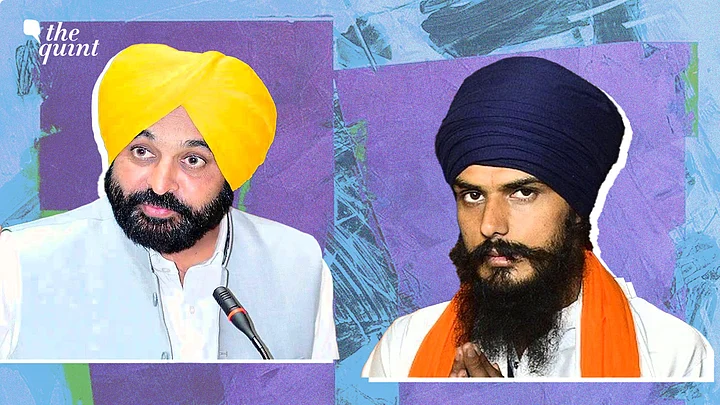Last week's violence in Ajnala has intensified a dilemma that the Aam Aadmi Party government in Punjab had been facing for the past few months - how to handle Waris Punjab De chief Amritpal Singh and his supporters?
The dilemma is a difficult one as both acting or not acting against Amritpal Singh come with their own set of repercussions, especially after the Ajnala incident.
This article will look at three aspects.
Why does the Ajnala incident mark a change?
What's the Bhagwant Mann government's approach towards Amritpal Singh?
What could be the political outcome of this?
Why Does the Ajnala Incident Mark a Change?
So far, the AAP government's ''wait and watch' approach didn't raise too many questions because Amritpal Singh and his supporters hadn't committed any major offence. There were only a few stray incidents that came in question.
This changed when one Varinder Singh filed a complaint against Amritpal Singh and some of his associates, accusing them of abducting him at Ajnala and assaulting him near Jandiala.
This complaint set in motion a chain of events.
A few days later, the police detained Amritpal Singh's aide Lovepreet Singh alias Toofan Singh and took him to Ajnala police station, which eventually sparked the protests.
Two things happened as a result of this
First, Amritpal Singh gained national prominence more than ever before.
The national media hadn't yet taken note of Amritpal Singh though his popularity had been increasing in Punjab. After the Ajnala incident, Amritpal Singh dominated the prime time debates with many channels calling him a "separatist" and "radical" who laid siege to a police station.
On the other hand, some in Punjab also came to see him as who saved a youth who had been wrongly arrested. On the day of the protest itself, the police gave a statement that there wasn't sufficient evidence against Lovepreet Singh and he was let off. Would that have happened had the protest not taken place? We don't know. But this is a state which saw large scale forced disappearances in the 1980s and 1990s. So the manner in which Lovepreet's release was secured, is significant.
The second thing that happened is that the violence at the protest called by Amritpal Singh, can probably provide the legal grounds for a case to be registered against him. Whether the case is registered or not is a political decision. Therefore, the ball is now firmly in the AAP government's court.
What's the Bhagwant Mann Government's Approach Towards Amritpal Singh?
It seems that the AAP government wants to take on Amritpal Singh politically rather than through the police. This nuance was evident in Chief Minister Bhagwant Mann's tweet following the Ajnala incident. He chose to target Amritpal Singh not for the violence that took place but for bringing the Guru Granth Sahib to the protest.
"A person who carries the Guru Granth Sahib as a shield to police stations cannot be called the 'Waris' (heir) of Punjab and Punjabiyat in any way," Mann tweeted.
Punjab DGP Gaurav Yadav also said in his press conference that the police acted with restraint because the protesters had come with the Guru Granth Sahib. He remained non-committal on whether a case will be registered against the leader.
It is clear that the AAP government's priority is to attack Amritpal Singh's political legitimacy rather than initiate a police crackdown.
There are also apprehensions that a hasty crackdown against Amritpal Singh, could backfire and make him even more popular.
The idea seems to be to focus on any mistake he makes from a Sikh perspective, rather than legally.
What Could be the Political Outcome of this?
The national focus on Amritpal Singh and related developments in Punjab is not a good sign.
Much of the national media is goading the AAP government into a full fledged crackdown against Amritpal Singh.
The BJP's has got a stick to beat AAP with, more so nationally than in Punjab. Its message to the national audience is that AAP cannot be a serious national option as "it has let loose Khalistanis in Punjab".
For a party like AAP which claims to be 'Kattar Rashtrawadi' or 'staunch patriots', such a label can be very harmful in its national expansion.
However, Mann's cautious approach seems to be aimed at preventing an escalation in Punjab. Perhaps the hope is that with time, Amritpal would make a mistake and lose legitimacy while the government may win back some political capital if it manages to fulfil at least some of its promises.
For instance on 28 February, 315 veterinary officers were given jobs in a highly publicised event, with CM Mann himself handing the appointment letters.
Mann's approach is in consistence with the approach followed by state governments in the past 25 years - in the past too, both the Akali and Congress led governments often looked the other way when stray pro-Khalistan events are held so long as there is no armed action involved. This approach can be seen as a safety valve that allowed pro-Khalistan elements to blow off steam.
Unfortunately for Mann, the national Overton Window has shifted. The manner in which the scrapping of Article 370 in Jammu and Kashmir was hailed across India as PM Modi's biggest achievement showed that the so-called 'national mainstream' wants to call the shots on what happens in areas that may have a different narrative from them. There is no scope for any safety valves now.
Given the sad reality of how the national TV media operates, it will probably take just one or two similar incidents for a full-fledged media created frenzy for a crackdown, or maybe even a demand for President's Rule in Punjab.
The Mann government would hope that, Amritpal Singh mellows down or loses popularity soon.
